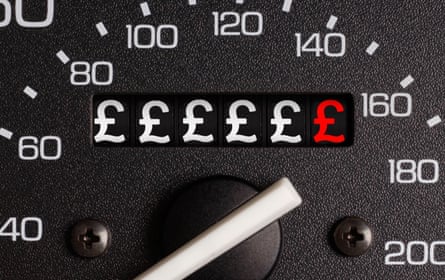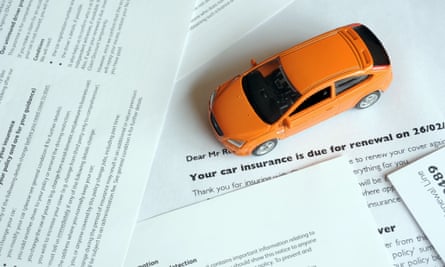
Car insurance costs may be racing ahead of inflation but there are things you can do to cut what you pay that will help some save hundreds of pounds.
Here we round up some of the key advice and insider tips.
Shop around
This has been the key piece of advice for years but bigger bills mean it is more important than ever. According to the price comparison website Compare the Market this week, drivers can now typically save up to £457 by shopping around. Earlier this year the site said the figure was £411, and late last year it was £328.
There are plenty of price comparison websites out there – others include Go.Compare, Confused.com and MoneySuperMarket. It only takes a few minutes, and some sites offer extra incentives to tempt potential customers.
UK drivers shocked as car insurance costs soar by up to 90%Read more
However, remember that not all insurers or policies feature on comparison websites. Direct Line and NFU Mutual are among the big names you won’t find on comparison websites.
Changes to insurance industry rules that took effect at the start of last year mean insurers are banned from quoting policyholders a higher price to renew than they would offer a new customer. That is, of course, good news, although it led to warnings that the millions of people who used to switch each year to get the lowest price would end up paying more, and so it has come to pass.
 View image in fullscreenData this week shows that motorists can typically save up to £457 by shopping around for car insurance. Photograph: Keith Leighton/Alamy
View image in fullscreenData this week shows that motorists can typically save up to £457 by shopping around for car insurance. Photograph: Keith Leighton/Alamy
Buy in advance
Don’t leave sorting out your insurance until the last minute. Experts say that buying it a few days or weeks before you need to can cut the cost significantly.
The very best day to renew insurance on your car is 27 days before your renewal is due, according to recent Go.Compare data. Its figures showed that policyholders could pay up to 50% more if they renewed their policy on the day it was due for renewal, compared with 27 days before. “While other changes may take more time or come with a cost, simply buying the policy on a different day is a great way to save some money,” it said.
It is thought some insurers view people who buy ahead of time as more organised, sensible or risk-averse, hence the lower price.
 View image in fullscreenRenew your car insurance sooner. Photograph: Rosemary Roberts/Alamy
View image in fullscreenRenew your car insurance sooner. Photograph: Rosemary Roberts/Alamy
Add a named driver
Motorists under 24 could save an average of £240 on their car insurance by adding an experienced named driver to their policy, while for those aged 25 to 34, it is £250, Compare the Market said this week. However, the site said: “It is important to note that all named drivers do need to drive the car for the policy to be valid.”
Beware of “fronting”, though, which is illegal and occurs when a parent or older person pretends they are the main user of a car when a younger person is driving it on a regular basis.
Check your mileage
“Low mileage means less driving, which means fewer chances of an accident, which lowers your premiums,” says the comparison website Uswitch.
However, it is common for people to overestimate their mileage when applying for insurance.
Dig out your MOT certificates to see your annual mileage from previous years.
Also, think about whether you can reduce your mileage, such as by cycling, taking the bus for some journeys, or carpooling with friends and colleagues.
 View image in fullscreenHave you considered carpooling? Photograph: SolStock/Getty Images/iStockphoto
View image in fullscreenHave you considered carpooling? Photograph: SolStock/Getty Images/iStockphoto
Linked to that, tell your insurer if you don’t use your car for work, or for commuting to and from work.
Think about your job title
Because insurance is based on risk, if an insurer believes your job is low-risk, your cover will be cheaper. Those considered lower-risk by the car insurance industry include … insurance workers.
If your occupation is considered high-risk, there may be things you can do. Of course, it is crucial that you are accurate and honest about what you do for a living. However, you may find that several job titles in the dropdown menu of occupations fit the bill.
“There will usually be more than one accurate description of your role,” Uswitch says. It adds that, for example, journalists who never leave their desks may be able to describe themselves as subeditors or writers rather than journalists, and that may bring the price down.
Insurers don’t like modified cars
Surveys have repeatedly indicated that things such as installing tinted windows and wider wheels, or even specialist paintwork or stripes, can significantly push up what you pay.
But there is one possible exception: getting a towbar fitted. It has previously been suggested this could cut your premium – presumably because the assumption is that you are not the sort of person who tears around the streets, and that pulling a heavy load will necessitate driving more slowly and carefully.
Think about getting a black box policy
Black box (or telematics) insurance rewards you for safer driving, and it can help younger motorists in particular to cut their costs. Typically, your insurer will fit a small GPS device in your car, or it will ask you to download a smartphone app. In both cases, these will monitor your driving and transmit data back to your insurer.
“Drivers are then rewarded with premium discounts based on how much or how safely they drive, with some policies tracking aspects of your driving such as braking and cornering, and others focused on rewarding low mileage,” says the consumer body Which?.
The tech often can’t distinguish one driver from another
There are lots of players in this market, including insurethebox, Carrot Insurance and big names such as Direct Line (DrivePlus), Churchill (DriveSure), Admiral (LittleBox) and the RAC (Black Box Car Insurance), although it has been suggested that, lately, good-value deals have become harder to find.
A parent or family member can usually be a named driver on the policy, so they can drive the car, too, and this may help bring down the cost. However, the tech often can’t distinguish one driver from another. “Most telematics policies will assess how the vehicle is driven overall rather than just how it is driven by the main driver. This means that the way any named drivers drive will be used by your insurer to calculate your premium,” the Association of British Insurers says.


